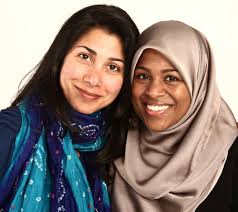Introduction: Love InshAllah
Ayesha Matta and Nura Maznavi
Muslim women–we just can’t seem to catch a break. We’re oppressed, submissive, and forced into arranged marriages by big-bearded men. Oh, and let’s not forget–we’re also all hiding explosives under our clothes.
The truth is–like most women–we’re independent and opinionated. And the only things hiding under our clothes are hearts yearning for love.
Everyone seems to have an opinion about Muslim women, even those–especially those–who have never met one. As American Muslim women, we decided this was an opportunity to raise our voices and tell our own stories. And what better tales to tell than love stories, which have universal appeal?
The search for love–with a Muslim twist–is captured in the title of this book, “Love InshAllah.” InshAllah (God willing) encompasses the idea that it is only through the will of God that we attain what we seek in life and is used widely among Muslims, regardless of their level of religious practice.
The subtitle, “The Secret Love Lives of American Muslim Women,” generated more controversy than we anticipated. Some accused
us of playing into an Orientalist fantasy about Muslim women, or of writing a salacious exposé of our faith community. Our intent was neither. We wanted to challenge the stereotypes of the wider American audience by presenting stories that are rarely heard, and, within the faith community, to create a space for Muslim women to share their lives honestly, across the full range of their experiences.
This book is not a theological treatise or a dating manual. It is a reflection of reality. We recognize that no book can fully capture all the voices and perspectives within the community, but we offer this as a beginning. We hope these stories start conversations within families and between communities about the similarities that bind us together, while recognizing and respecting the differences that enrich us.
We had only one criterion for women submitting stories to this book: that they self-identify as both American and Muslim. Some within our country doubt our Americanness by virtue of our faith. Some in our faith community gauge our Muslimness based on adherence to practice. The writers of Love,InshAllah present complex lives and identities that defy both of these assumptions.

